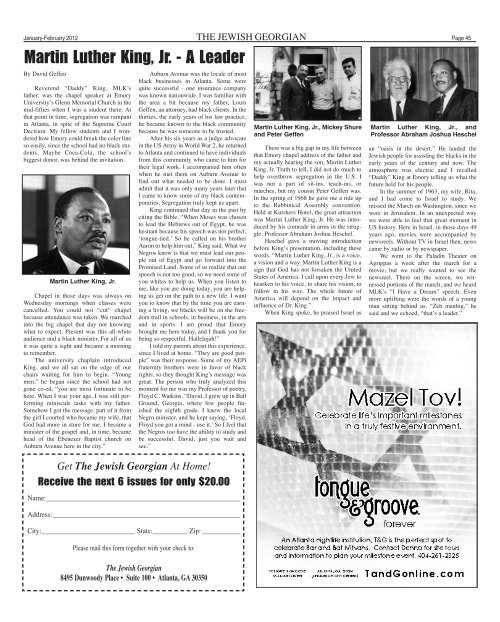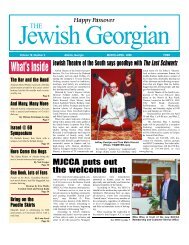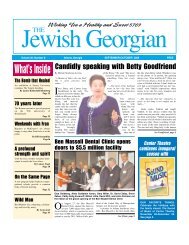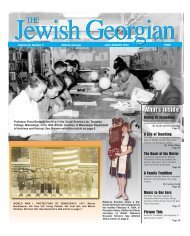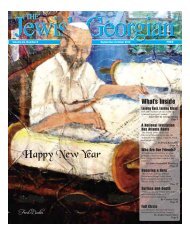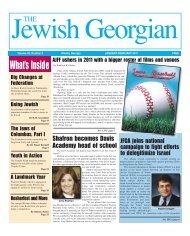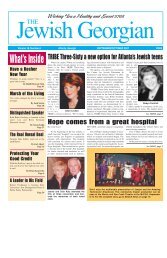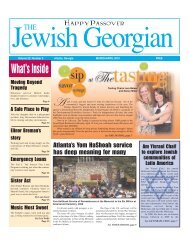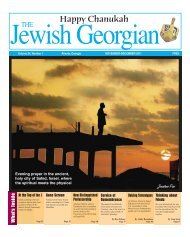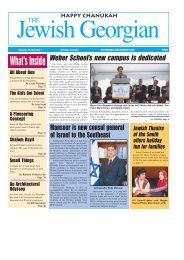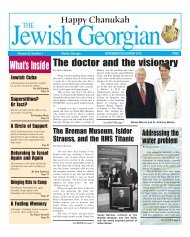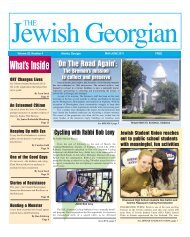January-February 2012 - The Jewish Georgian
January-February 2012 - The Jewish Georgian
January-February 2012 - The Jewish Georgian
You also want an ePaper? Increase the reach of your titles
YUMPU automatically turns print PDFs into web optimized ePapers that Google loves.
<strong>January</strong>-<strong>February</strong> <strong>2012</strong> THE JEWISH GEORGIAN Page 45<br />
Martin Luther King, Jr. - A Leader<br />
By David Geffen<br />
Reverend “Daddy” King, MLK’s<br />
father, was the chapel speaker at Emory<br />
University’s Glenn Memorial Church in the<br />
mid-fifties when I was a student there. At<br />
that point in time, segregation was rampant<br />
in Atlanta, in spite of the Supreme Court<br />
Decision. My fellow students and I wondered<br />
how Emory could break the color line<br />
so easily, since the school had no black students.<br />
Maybe Coca-Cola, the school’s<br />
biggest donor, was behind the invitation.<br />
Martin Luther King, Jr.<br />
Chapel in those days was always on<br />
Wednesday mornings when classes were<br />
cancelled. You could not “cut” chapel<br />
because attendance was taken. We marched<br />
into the big chapel that day not knowing<br />
what to expect. Present was this all-white<br />
audience and a black minister. For all of us<br />
it was quite a sight and became a morning<br />
to remember.<br />
<strong>The</strong> university chaplain introduced<br />
King, and we all sat on the edge of our<br />
chairs waiting for him to begin. “Young<br />
men,” he began since the school had not<br />
gone co-ed, “you are most fortunate to be<br />
here. When I was your age, I was still performing<br />
miniscule tasks with my father.<br />
Somehow I got the message, part of it from<br />
the girl I courted who became my wife, that<br />
God had more in store for me. I became a<br />
minister of the gospel and, in time, became<br />
head of the Ebenezer Baptist church on<br />
Auburn Avenue here in the city.”<br />
Auburn Avenue was the locale of most<br />
black businesses in Atlanta. Some were<br />
quite successful - one insurance company<br />
was known nationwide. I was familiar with<br />
the area a bit because my father, Louis<br />
Geffen, an attorney, had black clients. In the<br />
thirties, the early years of his law practice,<br />
he became known to the black community<br />
because he was someone to be trusted.<br />
After his six years as a judge advocate<br />
in the US Army in World War 2, he returned<br />
to Atlanta and continued to have individuals<br />
from this community who came to him for<br />
their legal work. I accompanied him often<br />
when he met them on Auburn Avenue to<br />
find out what needed to be done. I must<br />
admit that it was only many years later that<br />
I came to know some of my black contemporaries.<br />
Segregation truly kept us apart.<br />
King continued that day in the past by<br />
citing the Bible. “When Moses was chosen<br />
to lead the Hebrews out of Egypt, he was<br />
hesitant because his speech was not perfect,<br />
‘tongue-tied.’ So he called on his brother<br />
Aaron to help him out,” King said. What we<br />
Negros know is that we must lead our people<br />
out of Egypt and go forward into the<br />
Promised Land. Some of us realize that our<br />
speech is not too good, so we need some of<br />
you whites to help us. When you listen to<br />
me, like you are doing today, you are helping<br />
us get on the path to a new life. I want<br />
you to know that by the time you are earning<br />
a living, we blacks will be on the freedom<br />
trail in schools, in business, in the arts<br />
and in sports. I am proud that Emory<br />
brought me here today, and I thank you for<br />
being so respectful. Hallelujah!”<br />
I told my parents about this experience,<br />
since I lived at home. “<strong>The</strong>y are good people”<br />
was their response. Some of my AEPi<br />
fraternity brothers were in favor of black<br />
rights, so they thought King’s message was<br />
great. <strong>The</strong> person who truly analyzed this<br />
moment for me was my Professor of poetry,<br />
Floyd C. Watkins. “David, I grew up in Ball<br />
Ground, Georgia, where few people finished<br />
the eighth grade. I knew the local<br />
Negro minister, and he kept saying, ‘Floyd,<br />
Floyd you got a mind - use it.’ So I feel that<br />
the Negros too have the ability to study and<br />
be successful. David, just you wait and<br />
see.”<br />
Get <strong>The</strong> <strong>Jewish</strong> <strong>Georgian</strong> At Home!<br />
Receive the next 6 issues for only $20.00<br />
Name:________________________________________________________<br />
Address:______________________________________________________<br />
City:___________________________ State:__________ Zip: ___________<br />
Please mail this form together with your check to:<br />
<strong>The</strong> <strong>Jewish</strong> <strong>Georgian</strong><br />
8495 Dunwoody Place • Suite 100 • Atlanta, GA 30350<br />
Martin Luther King, Jr., Mickey Shure<br />
and Peter Geffen<br />
<strong>The</strong>re was a big gap in my life between<br />
that Emory chapel address of the father and<br />
my actually hearing the son, Martin Luther<br />
King, Jr. Truth to tell, I did not do much to<br />
help overthrow segregation in the U.S. I<br />
was not a part of sit-ins, teach-ins, or<br />
marches, but my cousin Peter Geffen was.<br />
In the spring of 1968 he gave me a ride up<br />
to the Rabbinical Assembly convention.<br />
Held at Kutshers Hotel, the great attraction<br />
was Martin Luther King, Jr. He was introduced<br />
by his comrade in arms in the struggle,<br />
Professor Abraham Joshua Heschel.<br />
Heschel gave a moving introduction<br />
before King’s presentation, including these<br />
words. “Martin Luther King, Jr., is a voice,<br />
a vision and a way. Martin Luther King is a<br />
sign that God has not forsaken the United<br />
States of America. I call upon every Jew to<br />
hearken to his voice, to share his vision, to<br />
follow in his way. <strong>The</strong> whole future of<br />
America will depend on the impact and<br />
influence of Dr. King.”<br />
When King spoke, he praised Israel as<br />
Martin Luther King, Jr., and<br />
Professor Abraham Joshua Heschel<br />
an “oasis in the desert.” He lauded the<br />
<strong>Jewish</strong> people for assisting the blacks in the<br />
early years of the century and now. <strong>The</strong><br />
atmosphere was electric and I recalled<br />
“Daddy” King at Emory telling us what the<br />
future held for his people.<br />
In the summer of 1963, my wife, Rita,<br />
and I had come to Israel to study. We<br />
missed the March on Washington, since we<br />
were in Jerusalem. In an unexpected way<br />
we were able to feel that great moment in<br />
US history. Here in Israel, in those days 49<br />
years ago, movies were accompanied by<br />
newsreels. Without TV in Israel then, news<br />
came by radio or by newspaper.<br />
We went to the Paladin <strong>The</strong>ater on<br />
Agrippas a week after the march for a<br />
movie, but we really wanted to see the<br />
newsreel. <strong>The</strong>re on the screen, we witnessed<br />
portions of the march, and we heard<br />
MLK’s “I Have a Dream” speech. Even<br />
more uplifting were the words of a young<br />
man sitting behind us. “Zeh manhig,” he<br />
said and we echoed, “that’s a leader.”


